UC Berkeley Web Feature
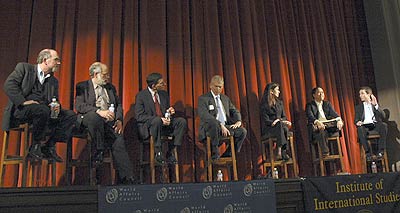 |
Steven Weber (far right), director of Berkeley's Institute for International Studies, moderated a panel of foreign policy experts for the IIS's 50th anniversary. (Bonnie Powell photos) |
'Power and influence': Panel debates U.S. foreign policy for a global future
BERKELEY – The United States may be the world's 800-pound gorilla when it comes to military might and command of resources, but its influence is on the wane, sapped principally by international perceptions that it no longer wields its power legitimately.
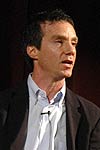 Steven Weber, director of UC Berkeley's Institute of International Studies and a professor of political science |
That was the consensus of seven foreign-policy experts assembled at International House Thursday night (Feb. 3) by UC Berkeley's Institute of International Studies (IIS). But the discussion, convened to celebrate the institute's 50th anniversary, did not stop at diagnosing the patient. Steven Weber, IIS director and the panel's moderator, set the agenda both for IIS's next half-century and for the evening's debate with his introductory comments. "Our objective going forward is to answer a big, audacious question," Weber said. "What kind of a world does the U.S. want to inhabit in 2010? And what policies do we need to institute to get there?"
The speakers tackled thorny questions from Weber on nuclear proliferation, America's shrinking stockpile of global goodwill and how - or if - it can be replenished, the role of transnational governing organizations, competition for natural resources, and more. The format was loose, and the participants bantered easily, building on or arguing with each other's assertions as they perched on uncomfortable-looking wooden stools.
The nuclear tipping point
Weber's questions actually were sets of questions, starting with whether we were at a turning point for nuclear proliferation. "Can we live with an overtly nuclear Middle East? How about Southeast Asia? What do we do if we read in the newspaper one morning that North Korea has tested a nuclear weapon?" he asked the group.
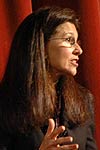 Jane Wales, president and CEO of the World Affairs Council of Northern California |
Jane Wales, president and CEO of the World Affairs Council of Northern California, immediately blamed that scenario on a failure of the diplomatic process. The United States was trying to play the "carrot and stick" game without offering enough carrots, or incentives, said Wales, who previously served in a dual appointment for the Clinton administration as associate director of the White House Office of Science and Technology Policy and senior director of the National Security Council.
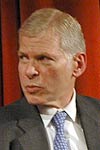 Leon Fuerth, Research Professor of International Affairs at George Washington University |
Leon Fuerth, like Wales a former Clinton association policymaker, observed that even if North Korea were to test nuclear weapons, it would not automatically signal disaster. Given today's international climate, he said, countries are more likely to cross the nuclear threshold and then retreat than they are to be deterred from crossing it in the first place. "The nuclear trip is not necessarily one-way; we have seen countries back out," said Fuerth, the former national security adviser to Vice President Al Gore. He is now a research professor of international affairs at George Washington University, where he leads the "Forward Engagement" program, focusing on long-range policy analysis. Fuerth was perhaps the evening's biggest headliner; fellow panelist Shibley Telhami was forced to cancel at the last minute due to illness.
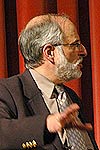 Jonathan Pollack, director of the Strategic Research department and the Asia-Pacific Studies Group of the Naval War College |
The consensus seemed to be that North Korea will not be deterred from joining the nuclear club. "With North Korea, everyone's talking about a diplomatic solution, but it's a bit like immaculate conception: a diplomatic solution in the absence of negotiation," joked Jonathan Pollack, director of both the Strategic Research Department and the Asia-Pacific Studies Group at the Naval War College. He hypothesized that the Bush administration might be dragging its feet on engaging with North Korea in the hopes that if it just waits long enough, Pyongyang's repressive government will be "out of business."
That possibility does not comfort Wales, who pointed out that we no longer inhabit "just a state-centric world. . I'm not just worried about what North Korea as a unitary state might do. I'm much more worried about North Korea selling that enriched uranium and other materials on the open market [at some point in the future]. . A nuclear failed state is not a world we want to be in," Wales warned.
Goodwill hunting - or not
Weber prefaced his next questions by recounting a BBC Europe poll conducted after President Bush's re-election, which reported that only 38 percent of respondents saw U.S. influence as positive. But instead of wringing our hands, Weber said, perhaps we should shrug it off. "So what? Does it matter for our foreign policy? The mainstream story is that 'We squandered all our global goodwill after 9/11. It could have been sustained, but we blew it on that Iraq thing.' Is that true? Does it matter? Should we care?"
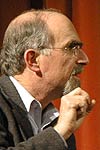 Bruce Jentleson, director of the Terry Sanford Institute of Public Policy and chairman of the Department of Public Policy Studies at Duke University |
Yes and no, answered Bruce Jentleson, director of the Terry Sanford Institute of Public Policy and chairman of the Department of Public Policy Studies at Duke University. A lifelong New Yorker and a diehard fan of the unstoppable-until-2004 New York Yankees, Jentleson said he was "used to people around the country resenting us for being No. 1." A certain amount of dislike comes with the territory of being a superpower, he shrugged.
However, enough dislike can turn into disadvantage. Jentleson described for the non-political-science majors in the audience the fundamental difference between power and influence. "Power is control of resources, the quantity of stuff I have. But if I can't use that to get you to do what I want you to do, or control outcomes the way I want them to be, then that power doesn't really matter," he explained. "If you don't have power that you can convert to influence, then you really can't get the things done that you want to get done. And there are very few problems that even we, as the most powerful country in the world, can solve on our own."
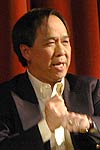 Yuen Foong Khong, Faculty Fellow at Oxford University's Nuffield College |
The waning of America's influence is due to changing perceptions about its legitimacy as a superpower, suggested Yuen Foong Khong, a faculty fellow at Oxford's Nuffield College and former acting director of the Institute of Defence & Strategic Studies at Singapore's Nanyang Technological University. He reminded the audience that America's war with Afghanistan had enjoyed widespread international support. "The perception used to be that the U.S. took international law seriously. It consulted with its allies. It cared about moderation, it was able to restrain itself in all those multilateral institutions in order to make the exercise of its power more acceptable," recalled Khong. But the pre-emptive strike against Iraq and the Abu Ghraib prison scandal, along with the United States' perceived favoritism in the Israel-Palestine conflict, have seriously eroded that support.
And while the United States is running an influence deficit, suggested Khong, another country is enjoying an influence surplus: China. China is playing the surprising role of responsible nuclear superpower by leading the six-party talks with North Korea, and as the engine of Asia's economic growth, it has successfully maneuvered a number of favorable free trade agreements.
Too legit to quit?
Can the United States reverse this trend, Weber asked, and regain some of its legitimacy? "And please don't tell me to be more even-handed in Israel-Palestine, because I hear that every day and I know that's not enough," he added.
Wales suggested that America issue a statement of its purpose. The country is being redefined in the eyes of the world, she said, as "united against a common enemy [terrorism] rather than united in a common commitment to the rule of law, to the shared values on which this country was founded" and support of international covenants such as the Geneva Convention. America needs to reiterate what "we have stood for, what we have championed."
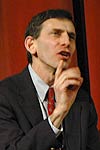 Joel Rosenthal, president of the Carnegie Council on Ethics and International Affairs |
Joel Rosenthal, president of the Carnegie Council on Ethics and International Affairs, said that listening to the Bush administration's rhetoric "reminds me of the statement that 'We should not become intoxicated by our own goodness.'" In response to Wales's proposal, he said it was important not just what the United States said, but what it does, going forward. The next few years could provide the "opportunity to reorganize, a chance to set some rules, some norms, and some ethics by which we declare we will behave."
Fuerth, the funniest and most caustic of the panelists, was quick to point out the flaw in this and other proposals: "I don't understand a discussion that treats the current administration as if it were wax to be molded. They're going to go their own way. What exactly is the point of talking about how the United States should behave, when we are represented by a government that doesn't care what we think?" Instead, he suggested, the panel should concentrate on predicting what outcomes might result from the actions the Bush administration is likely to take.
Returning to the question, Khong argued that the most immediate chance for the United States to regain some of its lost legitimacy was the possibility that following the elections in Iraq, the rate of violence would stay low for the rest of year, allowing "a democracy of sorts" to take root. "That would be a rather good thing, a favorable outcome for this administration, and they will claim victory," he said. "It will add legitimacy points."
So will any forward movement on the Israel-Palestine talks, he added. Yasser Arafat's death has opened a window of opportunity between the two countries, and perhaps the best thing the United States could do would be to stay out of the way, the panelists suggested.
As for what the world will look like in the next ten years - its environmental resources, dominant demographics, governance institutions - this group of seven experts offered a variety of possibilities, all accompanied by caveats.
"There is nothing so misleading as a straight-line projection," said Fuerth, pointing to the panicky predictions in the 1980s about Japan's unstoppable economic rise. Similar claims were being made for China's projected dominance over the next decades, but they could just as easily be derailed by escalating conflict with Taiwan and the free fall of China's elderly working class.
Fuerth predicted that, in the future, "Power will be more marbled - cake-wise, that is, with lumps of it here, swirls of it there. The United States will stand out less prominently in all categories than it does today." On one prediction, he and the other panelists were in agreement: "The problems of managing this system are going to be more complex."
The event was cosponsored by the Travers Program on U.S. Foreign Policy and the World Affairs Council of Northern California. A webcast of the entire two hours will be available through Educational Technology Services website by Monday, Feb. 14, at http://webcast.berkeley.edu/events/.
More information
Full biographies of the panelists:
- Leon Fuerth
- Bruce W. Jentleson
- Yuen Foong Khong
- Jonathan Pollack
- Joel Rosenthal
- Jane Wales
- Steven Weber
Read about the Institute for International Studies' 50-year history
Watch as experts and policymakers discuss other issues in foreign policy after 9/11 in Conversations With History interviews done by the IIS

